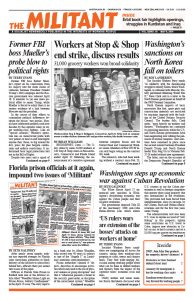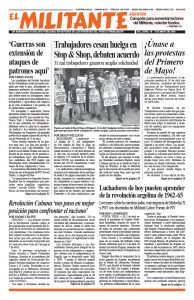The Socialist Workers Party stands “in solidarity with the decades-long struggle to reunify Korea, which Washington, in collusion with Moscow, brutally partitioned following World War II,” Steve Clark said in a letter to the North Korean government on behalf of the SWP National Committee.
North Korean imports of basic necessities like fuel, spare parts and construction materials are restricted by sanctions imposed with the backing of the United Nations Security Council. The burden falls, Clark notes, “most heavily on workers and farmers.” Washington has continued its punishing measures while the U.S. and North Korean governments have been negotiating over ridding the peninsula of nuclear weapons. And sanctions have remained in place since the second summit between President Donald Trump and North Korean leader Kim Jong Un in Vietnam Feb. 27-28 ended without new agreements.
The letter, sent on the occasion of the Democratic People’s Republic of Korea’s April 15 national holiday, calls for redoubling efforts “to force an end to all US-government-instigated economic and financial sanctions against” North Korea.
Kim told the North’s Supreme People’s Assembly April 12 that he was willing to meet with President Trump for more talks, but both sides need to “give up their unilateral terms and seek a constructive solution that meets each other’s interests.”
Less than a week later, North Korea announced that it had tested a “tactical” missile. But CNBC noted U.S. officials “played down the test” because it was a “short-range system rather than the ballistic missiles” that Washington would see as a threat. Pyongyang has launched no ballistic missile tests since November 2017.
Russian President Vladimir Putin invited Kim to meet him in Vladivostok, Russia, April 25. Moscow is seeking to establish its position as a player amid the moves by the U.S. rulers, Pyongyang and Beijing.
Pyongyang is seeking sanctions relief. After Moscow signed onto the U.N. sanctions last year, thousands of North Korean overseas workers there, a vital source of income, were forced to leave. Moscow says trade with the DPRK fell to $34 million last year.
Clark noted that “the US government’s announcement last month that it was permanently ending the annual joint Key Resolve and Foal Eagle war ‘games’ deploying tens of thousands of US and Republic of Korea troops” was cause for celebration “not only by the Korean people but by workers and farmers worldwide, and especially in the United States. These provocative exercises were an affront to Korean national sovereignty and a constant threat of war.”
Washington: 75 years in Korea
After World War II Washington divided the Korean Peninsula in half against the will of the Korean people, who had been resisting the occupation of their country by Japanese imperialism.
Washington imposed a bloody dictatorship in the South, which crushed popular uprisings across the country. In the North, Korean workers and farmers began a deep social transformation, including land reform and nationalization of basic industries.
From 1950 to 1953, Washington waged a brutal war, including the massive use of carpet-bombing and napalm, pushing almost to Korea’s border with China. Korean combatants, with the help of Chinese volunteers, pushed U.S.-led forces back and fought them to a stalemate, dealing U.S. imperialism its first ever military defeat.
More than 60 years later, the U.S. government has still not agreed to sign a peace treaty formally ending the war. Washington maintains more than 23,000 U.S. troops in the South to this day.
Ending the U.S. sanctions and other provocative measures are required, Clark wrote, “to open the road to talks between the US and Korean governments to bring about a complete halt to the deployment of nuclear weapons of any origin on the Korean Peninsula or its surrounding air and waters. This includes ending Washington’s nuclear ‘umbrella’ over South Korea and Japan and its deployment of nuclear-armed warships and submarines in the region.”
As part of the “fight to end all US imperialist interference in the sovereign affairs of the Korean people,” the Socialist Workers Party pledges to join with others worldwide in calling for an end to all economic and financial sanctions against North Korea and for U.S. forces and weapons systems to get out of Korea, Clark wrote. “For a nuclear-free Korean Peninsula! Korea is one!”

